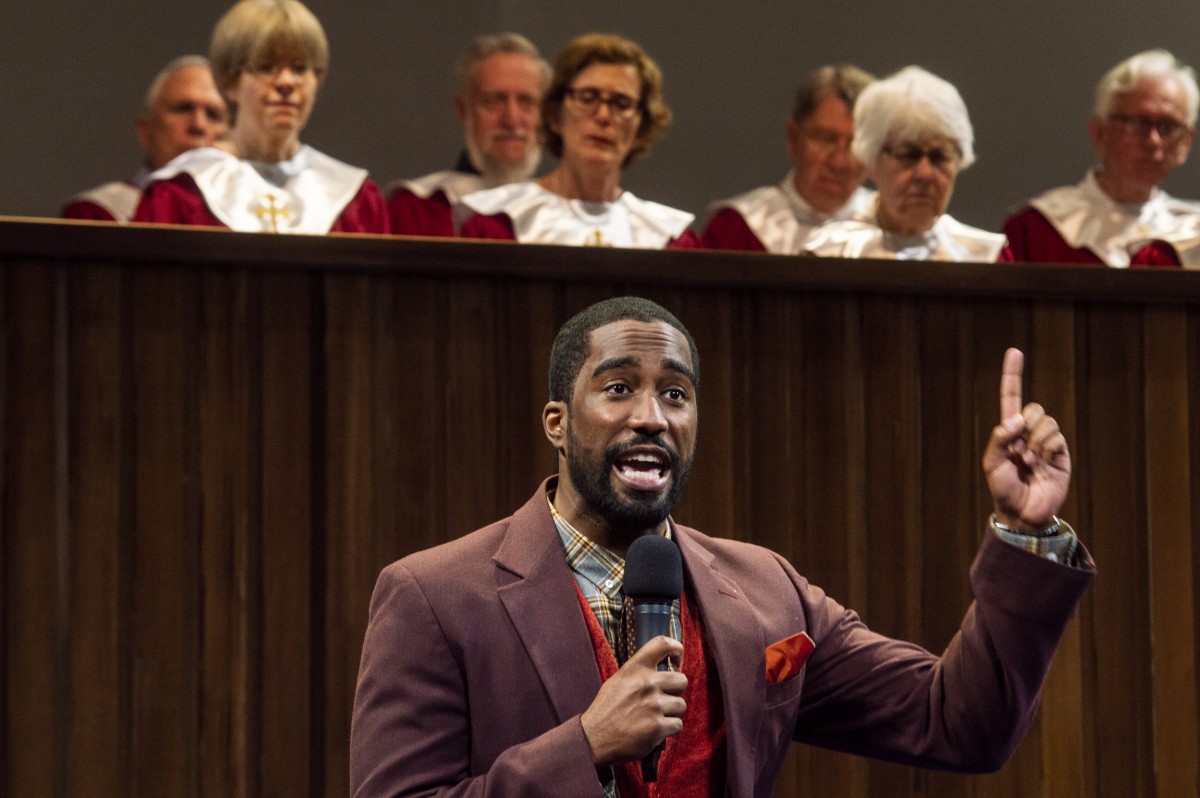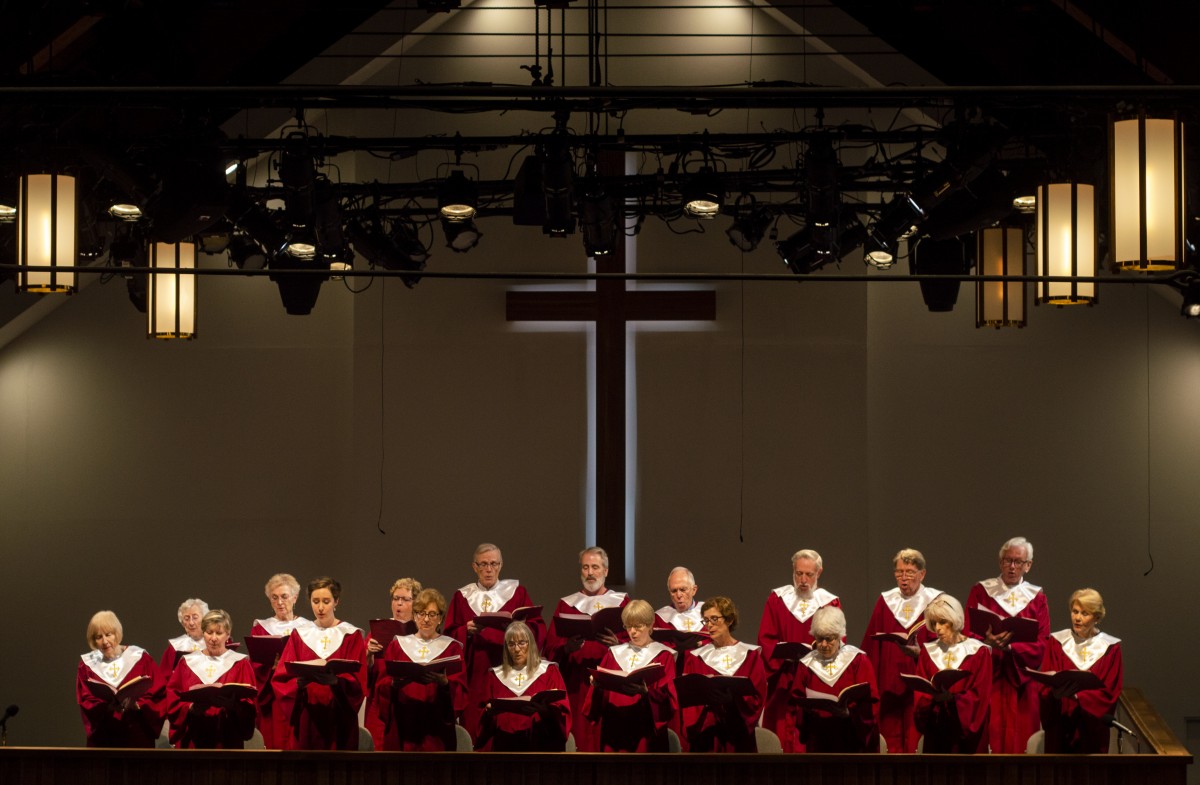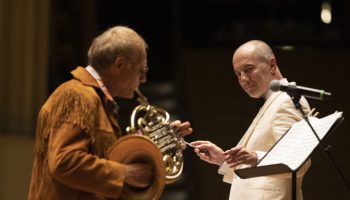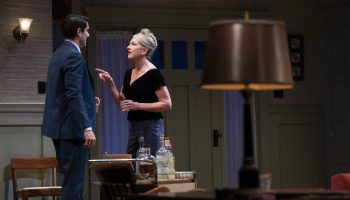Review by Eric Grode:
Chautauqua Theater Company’s first play of the season begins with a musical number, some two dozen voices strong. It ends stirringly. But no one in the audience claps.
Then the leading man steps forth, microphone in hand, and begins a lengthy monologue. Its very first line sets the stage while also uprooting us: “Brothers and sisters, let us pray.” And it is around this time that we realize the house lights are still on.
What the hell kind of play is this?
It is The Christians, Lucas Hnath’s nuanced dissection of the limits of tolerance within a contemporary megachurch. And its blend of earnest theology and Shavian verbal gymnastics makes the 2014 play a natural fit for Chautauqua Institution, as Hnath himself pointed out during an Amphitheater event last year.
That opening monologue is, of course, a sermon, one in which the charismatic Pastor Paul (a convincingly earnest Jamison Jones) touches upon the courtship of his wife and the church’s material success before pivoting to a harrowing act of violence in a suffering (but unnamed) country far away. A young man there died in the act of rescuing his sister from a bomb, and a missionary from the pastor’s (also unnamed) denomination regrets that this heroic young nonbeliever faces eternal damnation.
The ramifications of this idea lead Paul to detonate his own bomb, one that rattles the newly bought-and-paid-for church (conveyed effectively by Adam Rigg’s antiseptic scenic design) to its bones. “We are no longer a congregation that believes in Hell,” he announces from the pulpit. “We are no longer that kind of church.”
Well, then.
How does an entire congregation change a linchpin of its core theology on a dime? Does it? Should it? Hnath, a daring young playwright with two playfully revisionist works reaching Broadway in the last three seasons, and himself a former member of an Evangelical church, takes the respectful measure of these questions by approaching them from several different angles.
The skepticism toward Paul’s abrupt shift is apparent from the beginning, at first in Associate Pastor Joshua (the stealthily powerful Ricardy Fabre). And as the two pastors wrangle over scriptural interpretations in front of the congregation, The Christians feels at first like “12 Angry Churchmen,” with one progressive dissenter patiently converting the room one naysayer at a time.
But as we’ve learned in plays from Saint Joan to Galileo to The Crucible to A Man for All Seasons, speaking out against religious dogma can be a risky business. And as the pushback continues from the church’s bottom-line-conscious board of elders (led by the stentorian Malcolm Ingram), its congregants and even Paul’s wife (the terrific Stori Ayers), Hnath manages to convey the congregation’s estrangement from Paul without ever condescending to those more hidebound voices.
Some of his less thought-through twists get the better of director Taibi Magar and her cast: Why does Paul spar so commandingly with Joshua early on and then turn into a stammering, and vaguely sleazy, mess when a deceptively meek congregant takes issue with virtually the same concept just two scenes later? But Magar shows a keen ear for subtle shifts in power — you learn a lot about the various characters’ misgivings even when they are silent — and finds an almost ideal synthesis of emotion and rigor during even the most Scripture-heavy passages.
Incidentally, Fabre and Madeline Seidman (palpably touching as that concerned congregant) are the only two members of the vaunted CTC conservatory to take the stage, and their material adds up to roughly a half hour of stage time. Granted, the Motet Choir lends solid support throughout The Christians. But with just two mainstage productions this season, using guest artists for 60% of the speaking roles feels like an odd underutilization of CTC’s considerable resources. Here is a gentle prayer that One Man, Two Guvnors, its next show, will use more of these talented performers and create a sufficiently ungodly mess.
Eric Grode is the director of the Goldring Arts Journalism Program at Syracuse University and a regular freelance theater contributor to The New York Times.







